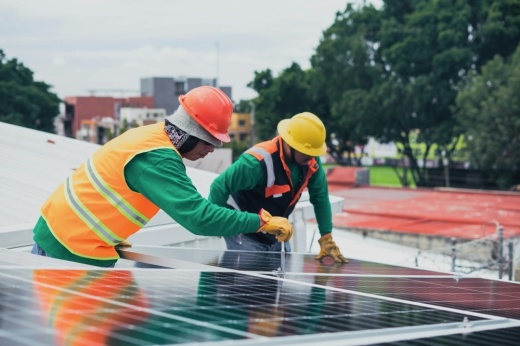In an effort to explore the growing impact of solar energy within the community, Lori Clark, senior program manager at the North Central Texas Council of Governments’ Transportation Department, broke down how solar panels can be useful for homeowners. She also advises how homeowners can find more information about solar panels.
This interview may have been edited for length and clarity.
How do solar panels work?
Solar panels are made out of primarily silicon sheets, but the sunlight energizes electrons in the solar panels themselves, which start moving around and create current, which creates electricity. So as long as you’ve got sunlight, and it doesn’t have to be full sun—cloudy days, work too—those solar panels are able to create energy on-site.
How much energy do solar panels provide?
So there's several key terms that you should know. One is a cell, which is like an individual square, generally of silicon material. If you see a solar panel, you see a lot of little squares, surrounded by silver outlines. Each individual square is a cell, and those cells are connected to each other in a single solar panel. I have a system on my roof of 24 panels. Most home solar panels are between 350 and 450 watts of power. That's about enough power to run something like a TV or a microwave. To power an entire home, you generally need 17 to 21 panels.
What are the benefits of having solar panels?
We've always been very fortunate in Texas, where our electricity rates have been lower than most of the country, but recently, a lot of residents in Texas have noticed that their power has gotten more expensive, right? Our cost per kilowatt has gone up. The benefit of higher electricity cost is that it makes solar more beneficial economically because you're generating your own power, so that's power that you don't have to pay the utility for. You still have to pay every month to be connected to the electric grid, and you do have to pay the capital cost of installing that solar array, but the cost of installing solar has come down like 90% over the past decade, so it's much less expensive now than it used to be. There's also a resilience benefit. During the winter storm, there were several people who had solar and battery storage in their homes, and they didn't lose power; it's able to run off of solar.
What are some drawbacks of solar panels?
The number one drawback is that they can be expensive, depending on how much you install at a home. You're not necessarily going to see the payback in a single year. It may take a few years for you to see the cost savings, so you have to be able to handle that upfront capital cost. It's important for consumers to do research and make sure that they find a solar vendor that is reputable and does good work. Most homeowners had been burned at one point or another by, you know, an unscrupulous contractor. It's just like anything else; you just have to be aware.
How do homeowners decide if switching to solar is right for them?
Homeowners should begin by understanding their household energy consumption patterns throughout the year. They should research local utility policies and incentives that may affect the financial benefits of installing solar panels. Assessing the roof's suitability for solar installation and obtaining multiple quotes from certified installers will provide a comprehensive view of costs, benefits and payback periods. Considering long-term residence plans and environmental goals will also help in making an informed decision.
What factors should homeowners consider if they decide to install solar panels?
First and foremost, how much power is that solar installation going to produce, and how much is your home going to use? You want to consider the experience of that solar installer. Check with the Texas Solar Energy Society or the North Texas Renewable Energy Group. Both of those are interest groups, advocacy groups, that are well-networked and know a lot about what's happening in the solar industry in Texas. So you want to ask what kind of certifications those solar installers have. North American Board of Certified Energy Practitioners is one of the industry's kind of one of the highest certifications. Solar United Neighbors is a nonprofit that does a lot of consumer education and kind of consumer protection things related to solar, so checking out the Solar United Neighbors website and tips and things like that for recommendations.





